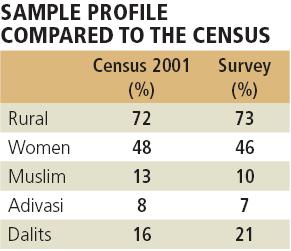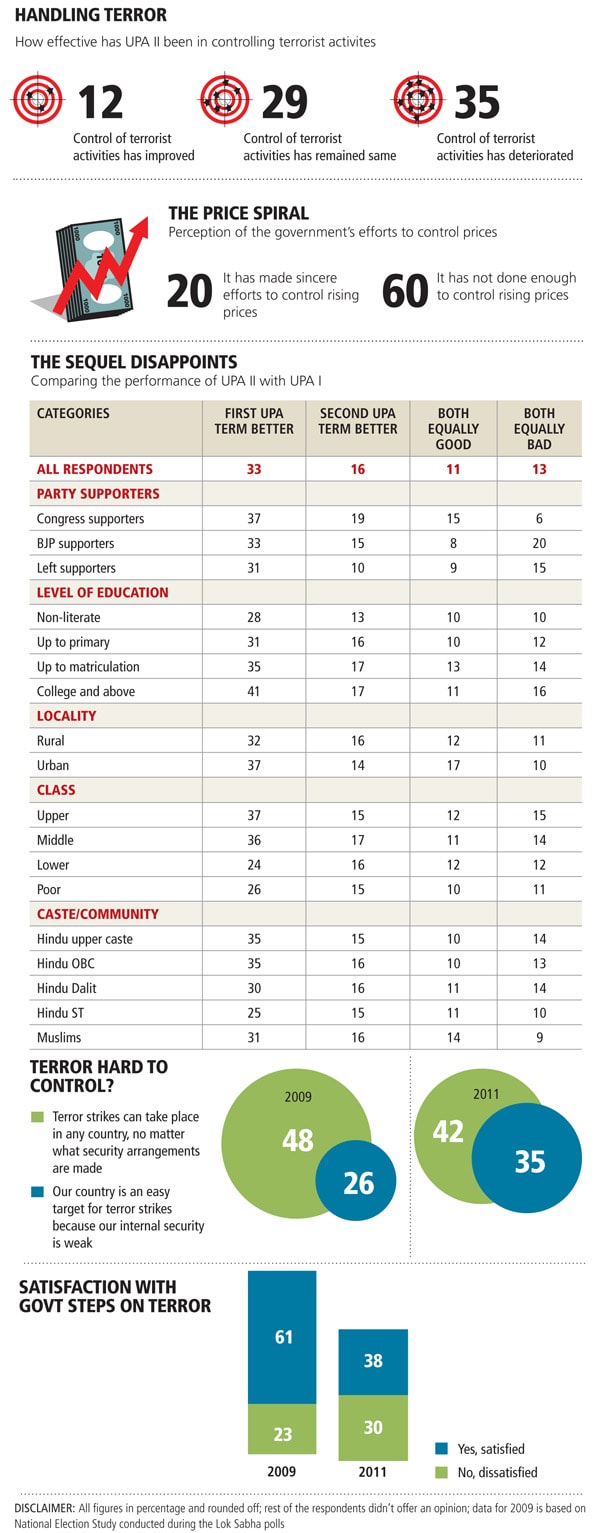
Examination: State Of The Nation Survey
The country is ready for a change in leadership but still reposes faith in the UPA. It is perhaps the TINA factor
In the popular movie Phir Bhi Dil Hai Hindustani, released a decade ago, matinee icon Shah Rukh Khan challenges others to try and understand being Indian. …Jitni bhi tum samjhoge utni hogi hairani…(the more you understand, the more bewildered you will be) his tumble and dance number goes. Foreign travellers in India would perhaps identify with the song. They can only marvel at the numerous paradoxes this vast country throws up at every turn.
In what could come as a shock to the critic, projections based on a survey show India would not only vote the Congress-led United Progressive Alliance back to power if elections are held today, but also to more seats in Parliament. In a nationwide survey conducted by Centre for the Study of Developing Societies over the past month for Forbes India, CNN-IBN and CNBC-TV18, people continued to retain faith in the Congress Party. Rahul Gandhi’s rural jaunts and high-profile padyatras seem to have paid off as he emerges the clear choice for the top job. Gandhi’s rise also coincides with a sharp drop in Manmohan Singh’s popularity. The massive corruption scandals and steep price rise under his watch have shaken the faith people had in the economist-politician.
One of the reasons for the UPA’s popularity seems to be its left-of-centre policies. Majority of the people are sceptical of the private sector and want the government to remain the lead actor. That coupled with the TINA (there is no alternative) factor seems to have turned the tide in Congress’ favour despite the consistent bad press. The negative publicity, however, does not appear to have percolated all the way down as a significant number of people have not even heard of the many corruption scandals.
Besides, principal opposition, the Bharatiya Janata Party (BJP), is simply unpopular. Party president Nitin Gadkari is the last choice among BJP leaders to become prime minister. People would prefer Gujarat strongman Narendra Modi as prime minister, but in the overall choices, no BJP leader even figures among the first three for the top job.
The survey has revealed a very interesting picture of the nation, one very different from what television channels broadcast and English media portrays. The economic condition seems to have more or less remained unchanged in the past few years though most also do not see their lot improving much. On many contentious issues such as land acquisition, the urban voice is shriller than the rural. More urban voters, who are unlikely to own land, were against land acquisition than their rural counterparts who are most likely to be dispossessed.
Forbes India presents, in the following pages, one of the most exhaustive surveys ever conducted on the state of the nation. We have published the most important findings in these pages.
How the Survey Was Done
The findings presented in the State of the Nation Survey 2011 are based on a survey conducted by Centre for the Study of Developing Societies (CSDS), Delhi, in 19 states of India.
A total of 1,300 locations were randomly selected (four polling stations each in 325 Assembly Constituencies). The survey could not be conducted at 10 locations (four in Assam due to floods, four in Chhattisgarh due to security risk and two in Andhra Pradesh). We have not received data from three assembly constituencies in Orissa (12 locations) as field investigators could not return in time from polling stations in remote areas.

A total of 39,000 randomly selected names from the updated electoral rolls were approached for interview of which 20,268 interviews were successfully completed. The sample comprised 46 percent women, 21 percent Dalits and 7 percent adivasis (scheduled tribes); 10 percent Muslims and 73 percent rural reflects the representativeness of the sample despite a slight over-representation of Dalits and a slight under-representation of Muslims (see table).
The interviews were conducted face to face at the place of residence of the respondent, using a standard-structured questionnaire in the language spoken and understood by the respondent. The voting question was asked using a dummy ballot paper and dummy ballot box to ensure secrecy. The fieldwork for the study was conducted between July 25 and 31, 2011.
RAHUL GANDHI FOR PRIME MINISTER
When it comes to factors influencing the mind of the Indian voter, charisma still seems to hold sway over everything else

UPA STRENGTHENS ITS POSITION
Manmohan Singh may have lost ground, but the ruling alliance has clearly maintained its edge over the rest

HOUSEHOLD CONFIDENCE
People are satisfi ed when it comes to their personal fi nances, but not with the overall economic situation

THE BIG FIGHTS
Land acquisition, taxing agricultural income and Pakistan are some of the contentious issues faced today

GOVERNANCE HAS DETERIORATED
Most people feel that UPA II has lost its way and is ineff ective in addressing serious issues


(This story appears in the 30 November, -0001 issue of Forbes India. To visit our Archives, click here.)






